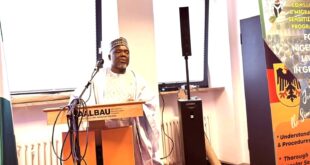In her new short autobiographic book, Cologne-based legal scholar and creative author Nesa narrates her story, of an African girl who was born in Germany but raised in the continent and now lives in the country of her birth. This is the 5th episode of Nesa’s chronicles, in which Nesa narrates her experience while she worked at the Embassy of Ghana in Berlin. “I saw people who seemed stuck in life,” she reflects, offering candid insights into the challenges faced by Ghanaians living in Germany and sharing practical advice for building a successful life in the country.
___________
What started as a three-month internship at the Embassy of Ghana in Berlin turned into more than six years of incredible experiences. Imagine being the youngest in the office, rubbing shoulders with Ambassadors, Ministers and Diplomats, and learning something new from each one of them.
There were lessons I picked up just by watching the pros at work and nuggets of wisdom from interacting with them. But I learned the most from the everyday people who walked into our offices daily, whether it was for a passport renewal, a renunciation, a deportation, or a voluntary travel certificate to go back home. These are the people whose stories stayed with me and had a lasting impact.
You could tell some people just needed someone to talk to; they wanted to share their stories. Being able to lend a listening ear was not only a huge help to them but also made me feel, for lack of a better word, useful. If I were to list everything I learned over those six-plus years, you’d probably grow a head full of grey hair before finishing this article.
So, to keep your youthful charm intact, I’ll stick to my usual three key lessons. Let’s dive right in and explore this rollercoaster journey together!
LESSON 1: Give Up the Woe-is-Me/Victim Mentality
At the Embassy, I encountered so many Africans filled with potential but capped by society. Whether they had been told it couldn’t be done or that it was impossible, these negative beliefs held them back. I remember writing my first children’s book and showing it to people. The first thing they said was, “But that won’t sell in Germany. Number one, it’s in English, and number two, because of the colour of your skin, they won’t even listen to you when you go to the libraries.” The list of discouraging remarks went on and on.
To be honest, I had heard most of these things before, but I made a choice that it would be different for me. I decided that my skin colour would not be a hindrance but rather a reason to succeed. I took my books to six different bookstores and was rejected by one—not because of my skin colour or because the book was in English, but because they had exceeded their budget for the year.

Could I have reached even more libraries if the book was in German? Probably. However, seeing my books being sold and sometimes even sold out in bookstores was the evidence I needed. It proved that if you do everything with excellence, good intentions, and faith that God will show up for you, what you can achieve is endless.
At the Embassy, I saw people who seemed stuck in life. They had been in the same menial jobs for over 20 years. Had they been able to send money home and help family and friends? Yes. Had they, in some cases, built homes back home? Yes. But were they living lives of peace, fulfilment, and joy in Germany? Unfortunately, in most cases, no.
I met a woman who showed me the mansion she had built back home. I was so impressed, but then she said she had lived in the house for only two weeks since it was built. She said this with such sadness and explained that where she lived in Germany, she could touch the corners of the walls if she stretched out her hands. She had arrived in Germany at 23 and was now 58. I asked her what she loved to do, and she said cooking. I wondered what could have become of her life if she had done an Ausbildung (apprenticeship) when she arrived to improve herself. Where would she be now?
As much as her house in Ghana is laudable, she could also own a home in Germany or even have built a restaurant back home and still be doing a well-paying job in Germany if she chose to stay. She could have had the flexibility of travelling with ease.
Yes, the German economy tries to ensure that everyone is well taken care of; hence the more you earn, the higher the taxes. Sometimes that might seem unfair, but there are still people in this same country paying those taxes and having more than enough to spare. What is stopping us from achieving our goals is us. There is nothing we cannot do if we put our minds to it. But first, we need to believe it is possible.
LESSON 2: Break Through the Glass Ceiling
Some people had been indoctrinated to believe that there was a limit to what they could achieve in Germany. It felt like there was an impenetrable glass ceiling, primarily because they were black and believed they wouldn’t get opportunities. Many had refused to try because they were convinced it wouldn’t work.
I observed other immigrants thriving despite these challenges. Restaurants owned by immigrants were scattered across Germany, run by people who believed they deserved success. Others had taken over IT roles in major corporations, filling significant gaps because they believed nothing was impossible. Some had even started creating start-ups, changing the narrative in a country where entrepreneurship wasn’t the norm.
So, why not us? Why were we still, in some ways, begging for alms when we could be the ones helping others? The difference was belief. Those who succeeded had a strong conviction that they could break through the glass ceiling. They didn’t let societal limitations dictate their potential.
The lesson here is to challenge the status quo and refuse to let preconceived limitations define you. Believe in your potential and take proactive steps to create your own opportunities. Whether it’s starting a business, pursuing a career in IT, or any other ambition, remember that you have the power to change your narrative and achieve great things.
LESSON 3: Strive to Grow in Your Profession, Even if It Means Leaving
Deciding to leave the Embassy was one of the most difficult choices I ever made. I knew my time there had come to an end when I realised I wanted to grow in my profession. As much as I loved working at the Embassy and had learned so much from the applicants, the countless people I had encountered, and my colleagues and bosses, it was time to move on.
I could only advance my career at the Embassy if I chose to become a diplomat. The idea of becoming a diplomat did cross my mind once, and I even got the forms to apply. But I had to ask myself if that was really what I wanted to do. Would this path truly fulfil me, bring me joy, and grant me the financial independence and generational wealth I craved?
Of course, the idea of travelling to different countries and representing my nation was appealing, but deep down, I knew it wasn’t my true calling. Working at the Embassy was just another step towards becoming who I am meant to be.
In Germany, you must make a conscious effort to improve and grow, especially in this fast-paced world where something new is always emerging. You need to stay abreast of the times and continuously seek opportunities for professional development. This can mean stepping out of your comfort zone, leaving a job you like, and pursuing new challenges.
Leaving the Embassy was a step towards fulfilling my true potential. It taught me that growth often requires tough decisions and the courage to leave behind what is familiar. By embracing change and striving for improvement, you can achieve greater fulfilment and success in your professional journey.
Practical Advice on Overcoming Victim Mentality
To break free from a victim mentality, it’s crucial to surround yourself with the right people and environment. Avoid those who constantly see the negative and downplay your achievements or aspirations. Instead, seek out individuals who inspire, support, and encourage you. Remember, people often say you can’t do something because they believe they can’t do it themselves. By choosing a positive and uplifting community, you empower yourself to overcome obstacles and strive for success.
Conclusion
In this episode, we’ve explored the importance of rejecting the victim mentality, refusing to be limited by society, and striving for professional advancement, even if it means leaving behind what’s familiar. Remember, your mindset shapes your reality; you can break through the glass ceiling. Do not become stale—always find avenues to grow and challenge yourself in your given profession.
LovE, Nesa!!
 THE AFRICAN COURIER. Reporting Africa and its Diaspora! The African Courier is an international magazine published in Germany to report on Africa and the Diaspora African experience. The first issue of the bimonthly magazine appeared on the newsstands on 15 February 1998. The African Courier is a communication forum for European-African political, economic and cultural exchanges, and a voice for Africa in Europe.
THE AFRICAN COURIER. Reporting Africa and its Diaspora! The African Courier is an international magazine published in Germany to report on Africa and the Diaspora African experience. The first issue of the bimonthly magazine appeared on the newsstands on 15 February 1998. The African Courier is a communication forum for European-African political, economic and cultural exchanges, and a voice for Africa in Europe.


































